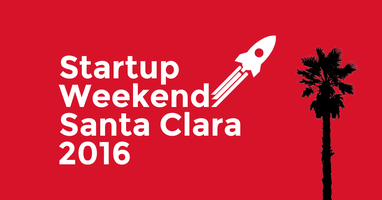I have been selected as a mentor for Startup Weekend Santa Clara Nov-11-2016; here are 5 ways that I plan to assist the teams of entrepreneurs taking part.
 Startup Weekend 2016 Santa Clara University
Startup Weekend 2016 Santa Clara University
- Start: Fri-Nov-11-2016 at 6:30 PM
- End: Sun-Nov-13-16 at 8:00 PM
- Where: Santa Clara University
500 El Camino Real, Santa Clara, CA 95050 - Register
- Info: Santa Clara Startup Weekend 2016
Meaningful and Persistent Firms
“Startup Weekend aspires to be starting point for entrepreneurs who want to create meaningful and persistent firms.”
from Startup Weekend Manifesto and Handbook
With this in mind the organizing committee has outlined three key goals for the event.
- The event should live beyond the weekend.
- Entrepreneurs should come away from the event with a new understanding of their potential impact and should learn new skills along the way.
- Team building is essential and we should optimize for creating teams and building lasting relationships between attendees, coaches, organizers, sponsors, and judges.
Five Ways I Plan to Assist As a Mentor for Startup Weekend
These are based my participation a two earlier Startup Weekends, one on San Jose in 2012 and one in San Francisco in 2014. In both cases I spent several hours all three days helping the teams, which allowed me to get to know them and to track their progress over the weekend.
- Minimize the “contest” aspect of the event: the idea of fostering competition between the teams works against collaboration during and after the event. It can also trigger the disintegration of teams who are “losers” because they take the judges assessment of their idea and current implementation as final.
- Encourage at least one post-weekend team meeting or call, before the results of the judges rankings are known. There is value in forcing a presentation at the end of the event to create a deadline to summarize progress and provide some focus for the efforts of each team. I do wish the judges would act more like potential board members and coach each time on how to improve or move forward and less like potential investors but that is beyond my control. I will encourage each team to schedule at least one follow up call or meeting, if only as an after-action or lessons learned session.
- Connect teams with potential customers or relevant experts during the event. After time the teams form on Friday night I try and identify at least one outside domain expert they can talk to and arrange a skype call sometime on Saturday.
- Encourage connections between different teams and members of different teams. The teams form Friday night and most of the entrepreneurs spend the vast majority of their time with their other team members. As an advisor I float between teams and can often suggest connections that may either help move things forward during the event or lead to connections after the event.
- Encourage entrepreneurs who suggest a startup idea before teams are formed. The format of the event is that about 1/3 to 1/2 of the attendees come with an idea they present to the crowd. There is then a team formation process where 8 to 12 teams are formed and about 1/4 of the attendees leave because their idea was not chosen. I try and pick what I think are the best three or four ideas and reach out to the presenters personally to offer them an office hours session in the event they are not able to form a team of critical mass.
Startup Weekend Compresses First 3 Months of a Startup into 3 Days
If you have not worked in a startup before and want to spend a weekend experiencing many of the highs and lows you will likely find in your first three to six months in a startup, a Startup Weekend can be good preparation.
Related Blog Posts
- Mentor at B2B Startup Weekend San Francisco 2014
- Mentoring at Startup Weekend San Jose Jan 27-29 2012
- The Fact That Your App Was a Weekend Project Is Not a Feature
- Advising Entrepreneurs
- The Challenge of Advising Entrepreneurs
- Seeing the Elephant: The Entrepreneur’s Challenge in Integrating Advice
- Jason Yip “How I’d approach Startup Weekend if I did it again” offers four key takeaways I found very useful:
- Go to where the customers are: Get out of the building and talk to potential customers. Everyone on the team should do this and at a minimum the founders should.
- Build prototypes earlier: I’ve tended to have a reluctance to build much until we’ve validated with interviews and things like magic tests but now I’m thinking using multiple prototypes of many forms to learn both what customers want as well as just to allow more technical engagement.
- Collective learning over throughput: Involve everyone in the learning process so we all learn about what we should build together. This might end up being slower but it rubs me the wrong way otherwise.
- Focus on insight and creativity, not on how to impress potential investors: Learning and experiencing how to identify and solve a valuable problem in a very short period of time is the point of the exercise. The fact that there is a structure around competition and judging might mislead you into thinking it’s about something else.
- A cautionary note: Startup Fantasy Camp

Pingback: SKMurphy, Inc. Mentor at B2B Startup Weekend - SKMurphy, Inc.
Pingback: Silicon Valley July/August 2016 Roundup
Pingback: SKMurphy, Inc. Interview With Shane Reiser On Your Ideas Are Terrible - SKMurphy, Inc.